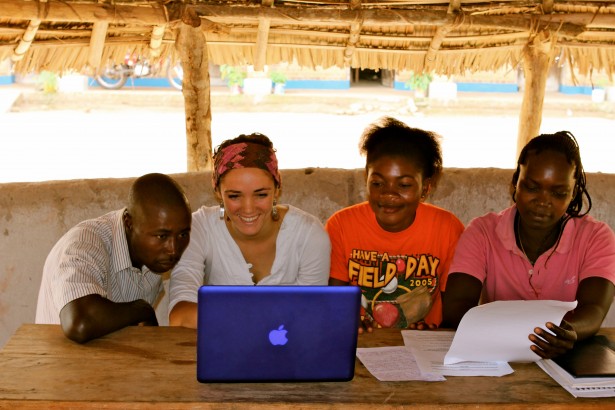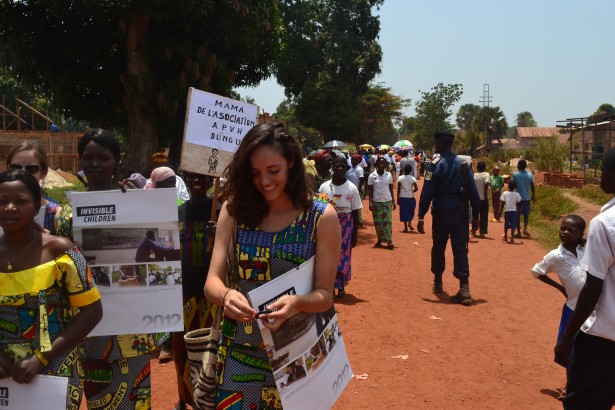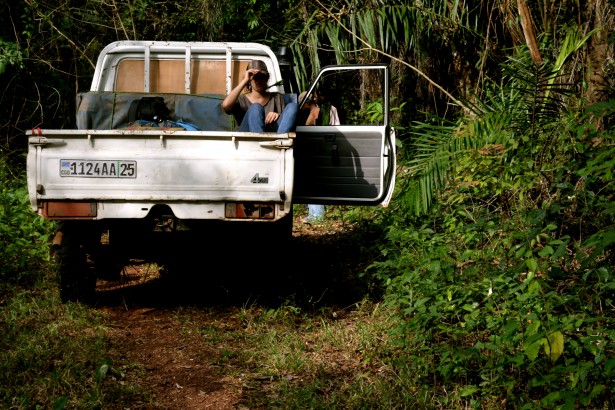Margaux Fitoussi first heard about Invisible Children after reading an article about our Early Warning Radio Network. She was intrigued by this form of civilian protection – a mechanism that directly involves communities affected by the LRA and contacted Sean Poole, our Counter-LRA Programs Manager. After volunteering her time with Sean and the network, Margaux received $25,000 from the University of California, Berkeley to partner with Invisible Children. Margaux’s work has played a crucial role in our Protection program, an area of our unique four-part model, in the Democratic Republic of Congo and the Central African Republic (CAR), and as she prepares to move into the next chapter of her life we wanted to catch up with her and learn more about her time working in central Africa.
Can you briefly describe the day-to-day duties of your position?
I am currently based in Obo, Central African Republic (CAR). However, I spend very little time in the office because I’m usually traveling around, meeting with IC’s local civil society partners, training the Local Protection Committees at different field sites in the Haut-Mbomou and Mbomou, and working on building the capacity of the FM radios by training journalists and management committees. The one routine I can count on is enjoying a coffee at 6:30 AM (the entire community of Obo is awake by 5) while looking out across the verdant landscape!
What is it like working in the Central African Republic? What challenges do you face and what goals did you achieve?
Living in central Africa for 18 months has taught me that I enjoy the problem solving that comes with working in a complex environment and operating independently. Learning to navigate the challenging political and social landscape has improved my analytical skills and my ability to make critical, informed, and effective decisions in a timely fashion.
One of my primary responsibilities has been establishing IC’s base in Obo and programs in the LRA-affected areas of CAR. This has meant living by gas lamp, taking motorcycle-taxis, showering out of buckets, and living sans Internet for almost the entirety of my time in CAR. On a practical level, logistics in CAR are extremely challenging. In particular, the recent coup d’état in CAR has exacerbated banditry in the region and led to an increase in banditry along the main road. The difficult terrain, however, has made working with these vulnerable, remote communities that much more rewarding.
The majority of the time I have spent working with my Congolese and central African colleagues, I encountered difficulties in building capacity building and working as a leader in cross-cultural contexts. It took time to learn how to motivate my team and to gain their respect. I also came to really value my colleagues’ mediation and diplomacy skills.

What aspect of your position excites you the most?
CAR is known as the “forgotten African nation.” Witnessing first-hand the repercussions of geopolitics on the civilian population has been eye opening. The human security approach Invisible Children has taken in addressing the LRA phenomenon, in particular the Early Warning Network, is incredibly valuable, as both a civilian protection mechanism for the communities it is working to connect and valuable source of information for the international community. Working to improve this network has taken me to some of the most isolated communities in the world. It’s the heightened intensity of this kind of fieldwork – wondering whether the dilapidated truck will make it across the log bridge, explaining to the Brigade Commander that the HF community radios are not for military usage and only to be used for humanitarian purposes, and then relaxing around the campfire under a starry sky – that compels you to be truly present in the moments you are experiencing.
What are your plans for the future?
My family history, studies at UC Berkeley, research in South Africa, and professional experience in DR Congo and the Central African Republic have contributed to my interest in the phenomenon of transnational smuggling. I will apply to graduate school in the fall of 2013 to study the dynamics and the profiles of smugglers moving goods through the Saharan desert to the Maghreb. Although, in my career thus far, I’ve learned that plans often change.
We’re currently looking for a Project Officer to work in the Central African Republic. In this role, you’d be a key member of our Obo based team, and a crucial part of regional efforts to end LRA violence. Read the job description and apply.


Think people should hear about this?